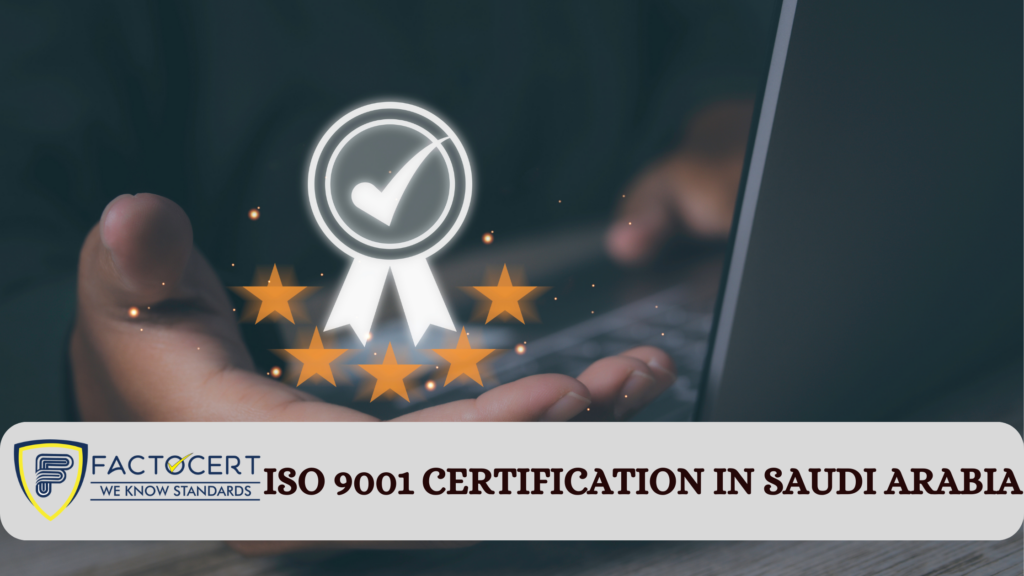ISO 9001 Certification in Saudi Arabia
ISO 9001 certification in Saudi Arabia in today’s competitive business landscape, quality management is paramount for sustainable growth and customer satisfaction. For companies in Saudi Arabia aiming to demonstrate their commitment to quality, obtaining and maintaining ISO 9001 certification is a significant milestone. However, this process involves financial considerations that need to be carefully evaluated. In this blog, we’ll delve into the costs of acquiring and sustaining ISO 9001 certification in Saudi Arabia, exploring various aspects and critical considerations.
1. Initial Certification Costs:
Acquiring ISO 9001 certification in Saudi Arabia requires an initial investment in an effective Quality Management System (QMS) that aligns with the ISO 9001 standards. This investment typically includes:
Consultation and Training:
Companies often seek assistance from consultants or hire internal experts for help with the certification process and ensuring compliance with ISO 9001 requirements. Training programs for employees on quality management principles may also be necessary.
Documentation:
Developing and documenting the QMS, including quality manuals, procedures, work instructions, and record-keeping systems, incurs costs for writing, reviewing, and organizing these documents.
Internal Audits:
Conducting internal audits to assess the QMS’s effectiveness and identify improvement areas involves allocating resources for training internal auditors, conducting audits, and documenting findings.
2. Certification Body Fees:
Once the QMS is established, companies must engage with accredited certification bodies to undergo the certification process. Certification body fees vary depending on the organization’s size and complexity, its scope of certification, and the reputation of the certification body. These fees cover:
Application and Assessment:
Companies must apply to the certification body, which includes information about the organization’s QMS and operations. The certification body then conducts an assessment to determine the organization’s readiness for certification.
On-Site Audit:
The certification body conducts an on-site review of the effectiveness and implementation of the QMS. This audit involves assessing processes, interviewing employees, and reviewing documentation.
Certification Decision:
Following a successful audit, the certification body issues the ISO 9001 certificate and a surveillance plan for ongoing audits and assessments.
3. Ongoing Maintenance Costs:
Maintaining ISO 9001 certification in Saudi Arabia requires ongoing investment to ensure the QMS remains effective and compliant with ISO standards. These maintenance costs include:
Annual Surveillance Audits:
Certification bodies conduct annual surveillance audits to verify that the organization continues to adhere to ISO 9001 requirements. Companies incur costs associated with auditor fees, travel expenses, and preparation for these audits.
Training and Development:
Continuous training and development initiatives are essential to inform employees about quality management principles and updates to ISO 9001 standards.
QMS Updates:
As business processes evolve, organizations may need to update their QMS documentation and procedures to reflect these changes, incurring costs related to document revision, training, and communication.
4. Tangible and Intangible Benefits:
While costs are associated with obtaining and maintaining ISO 9001 certification in Saudi Arabia, it’s essential to consider the tangible and intangible benefits of it. These benefits may include:
Enhanced Credibility:
ISO 9001 certification in Saudi Arabia enhances the organization’s reputation and credibility, demonstrating a commitment to quality and customer satisfaction.
Improved Efficiency:
Implementing a QMS based on ISO 9001 standards often leads to improved processes, increased efficiency, and reduced waste, resulting in cost savings.
Access to Markets:
ISO 9001 certification in Saudi Arabia opens new markets and business opportunities, as many customers and partners require or prefer working with certified suppliers.
In conclusion, while financial investments are involved in obtaining and maintaining ISO 9001 certification in Saudi Arabia, the long-term benefits outweigh the costs. By prioritizing quality management and meeting ISO 9001 standards, organizations can position themselves for sustainable growth, enhanced competitiveness, and greater customer trust and satisfaction.
Why Factocert for ISO 9001 Certification in Saudi Arabia
We provide the best ISO consultants Who are knowledgeable and provide the best solution. And to know how to get ISO certification. Kindly reach us at contact@factocert.com. ISO Certification consultants work according to ISO standards and help organizations implement ISO certification with proper documentation.
For more information, visit ISO 9001 Certification in Saudi Arabia





